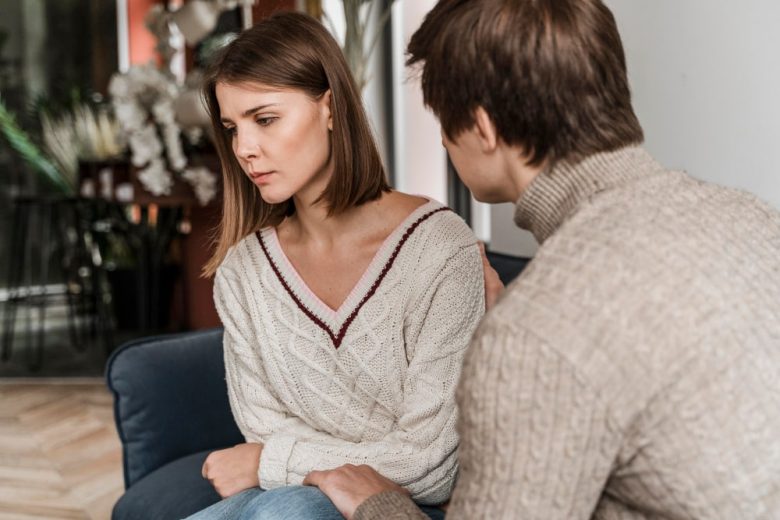Have you recently had a disagreement or argument with your partner? Are you now worried about how to apologize in a relationship? Apologizing can be challenging, especially when we are feeling hurt or angry. But do you know that learning how to apologize effectively is a crucial skill to have in any relationship?
Knowing how to apologize can help mend relationships and prevent conflicts from escalating. Most importantly, it shows your partner that you value and respect their feelings. Here I’ll share some tips on how to apologize in a relationship and make things right with your partner. All of these tips are based on effective communication and compromise.
Why Is Apologizing Important in a Relationship?
Apologizing is important in any relationship because it helps to build and maintain trust, respect, and understanding between partners. It shows that you are willing to take responsibility for your actions and make efforts to improve the situation.
Apologizing also shows that you value your partner’s feelings and their well-being in the relationship. It can help to resolve conflicts and prevent future misunderstandings. By apologizing, you are acknowledging the impact of your behavior and showing empathy towards your partner’s feelings.
Here are some reasons why apologizing is important in a relationship:
- Builds Trust and Respect
- Promotes Open Communication
- Encourages Forgiveness and Reconciliation
- Validates Your Partner’s Feelings
- Shows Maturity and Responsibility
- Helps to Avoid Grudges and Resentment
- Improves the Quality of the Relationship
These are just a few of the many benefits of apologizing in a relationship. Let’s see how we can effectively apologize to our partner.
Related Reading: Overcoming Jealousy in Relationships
Tips for Effective Apologizing in a Relationship
Recognize your mistakes
The first step to apologizing in a relationship is to acknowledge and recognize your mistakes. This shows that you are taking responsibility for your actions and understand the impact they had on your partner. It also helps to avoid making excuses or shifting the blame onto someone else.
I have seen many people struggle to admit their mistakes, fearing that it will make them look weak. However, the truth is that admitting your mistakes takes courage and shows strength in your character.
Be genuine
A sincere apology requires genuine emotions and words. Yes, saying sorry is important, but it’s equally essential to convey the sincerity behind your words. Your partner needs to know that you truly regret your actions and that you are willing to make amends.
Be honest about your feelings and be open to listening to how your partner feels. This will help rebuild trust and create a stronger bond between the two of you. Remember, genuine apologies come from the heart and not just from the lips.
Take responsibility
Take responsibility for your actions and accept any consequences that may come from them. This means owning up to your mistakes and accepting the impact they have had on your partner and the relationship. Avoid making excuses or placing blame on others, as this will only create further distance and damage in the relationship. Instead, take ownership of your actions and show your partner that you are willing to make amends.
Communicate openly to apologize in a Relationship
No matter how strong a relationship is, there will be times when apologies are necessary. Apologizing in a relationship is not just about saying “I’m sorry”, but rather it involves taking responsibility for your actions and communicating openly with your partner.
Many people struggle with apologizing because it can be difficult to admit their mistakes and shortcomings. However, a genuine apology can strengthen your relationship and bring you closer to your partner. your partner’s feelings or causing them pain. It shows that you value their feelings and are willing to make amends for your actions.
Here are some tips when communicating and making amends with your partner:
- Use “I” statements
- Listen actively
- Show genuine remorse and understanding
- Make a plan to make things right and follow through with it
- Give your partner the space to share their feelings freely.
- Don’t get defensive or make excuses
Offer to Make Amends
Sometimes, just saying sorry might not be quite enough. If you have hurt your partner deeply, it may be necessary to offer to make amends in some way. This could be through a grand gesture or simple acts of kindness and consideration.
I remember one instance where I unintentionally hurt my partner’s feelings by not prioritizing their needs. I planned a surprise weekend getaway and made sure their want and needs were taken care of. This helped to show that I recognized my mistake and was willing to make amends for it.
Making amends can also be a way to rebuild trust and repair any damage caused by your actions. It shows that you are taking responsibility for your behavior and are committed to making things right.
Give Your Partner Time and Space
One of the best ways to apologize is to give your partner time and space to process their emotions. It can be difficult for them to forgive and forget right away, especially if they were deeply hurt by your actions.
Respect their need for space and do not pressure them into forgiving you immediately. Instead, give them the space to reach their own decision at their own pace. This shows that you are willing to give them the time and space they need to heal and rebuild trust.
You may like: The Importance of Respect in Relationships
How was my experience with apologizing in a relationship?
My experience with apologizing in a relationship has taught me that it is not easy to admit when you are wrong and apologize sincerely. It takes courage, vulnerability, and humility to own up to your mistakes and ask for forgiveness from your partner. However, I have also learned that a genuine apology can go a long way in repairing and strengthening the relationship.
In my experience, the best way to apologize is to first reflect on your actions and understand why you are apologizing. This will help you deliver a sincere and specific apology instead of a generic “I’m sorry.” It is important to take accountability for your mistakes and avoid making excuses or shifting blame.
It is also crucial to acknowledge how your actions may have hurt or affected your partner. This shows that you understand the impact of your behavior and are genuinely remorseful. Additionally, offer to make amends or find a way to prevent similar situations from happening in the future.
Bottom Line
Apologizing in a relationship is not always easy, but it is essential for the health and longevity of any partnership. It requires humility, honesty, and effective communication. By following the steps outlined in this guide, you can learn how to apologize in a meaningful way that strengthens your relationship rather than weakening it.
Every relationship is unique, and there may be additional factors to consider when apologizing. It’s crucial to always listen and be open to feedback from your partner about how they feel and what they need.
Frequently Asked Questions
How do I know when I need to apologize?
If your actions or words have hurt someone, or if your partner expresses that they are upset, it’s a good indication that an apology is necessary. Reflect on the situation and prioritize their feelings.
What makes an apology meaningful?
A meaningful apology includes acknowledging your mistake, expressing genuine remorse, taking responsibility, and offering a plan to make amends.
Is it okay to apologize even if I don’t think I was wrong?
Yes, you can apologize for the impact your actions had on your partner, even if your intentions were not harmful. Empathy is key in maintaining trust and understanding.
What if my partner doesn’t forgive me after I apologize?
Forgiveness may take time, respect your partner’s process, and continue showing that you’re committed to improving and understanding their feelings.
How can I ensure I won’t repeat the same mistake?
Reflect on the situation, identify what led to the error, and take proactive steps to change your behavior.
Read More: Rebuilding a Relationship After a Breakup



